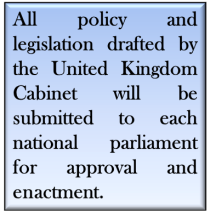Power and Decision Making will be Shared Equally in the New Union
First and foremost within the new Union there will be two parliaments of equal standing. It is presumed that one will be located in London, and for the scope of this proposal it is assumed that this parliament will represent England and the other nations of the British Isles. This parliament is referred to as the British parliament in the discussion that follows. The second parliament will be the Scottish parliament located in Edinburgh. As this will be a confederated Union the parliament of the United Kingdom of Great Britain and Northern Ireland will no longer exist.
As figure 2 illustrates, both the parliament of Britain and the parliament of Scotland will have a First Minister and a Cabinet of Ministers formed by the ruling party or coalition. Each national government will have full power and control over all matters not covered by the new Union treaty. These national powers are likely to include all fiscal matters, the environment, transport, health, education, and most importantly, economic development. Discussion on the powers to be unified will commence from a position where all power is considered to have been devolved to the national governments. From this starting point the discussions will identify and agree the power to be unified within the Union.
From the cabinet of each national government a small sub-set of ministers will be appointed to the new United Kingdom Cabinet. The new United Kingdom Cabinet will perform the type of roles performed by both the EU European Council and the Council of Ministers, but the United Kingdom Cabinet, as with the European Council, will have no legislative power. All policy and legislation drafted by the United Kingdom Cabinet will be submitted to each national parliament for approval and enactment. No new United Kingdom law will come into force until approved by both national parliaments; this reflects the situation with most EU legislation being created today.
The ministers appointed to the new United Kingdom Cabinet will take on the United Kingdom ministerial roles on an equitable basis. For instance, the posts of Foreign Minister and Finance Minister might be held by Scottish ministers with the Europe Minister and Defence Minister roles being held by British Ministers. The key positions of United Kingdom Prime Minister and United Kingdom Deputy Prime Minister will be held by the First Ministers of England and Scotland and will rotate between them at the end of each Cabinet term. This procedure will be very similar to the procedure that was adopted for managing the rotation of the Presidency of the Council of the European Union until 2009.




